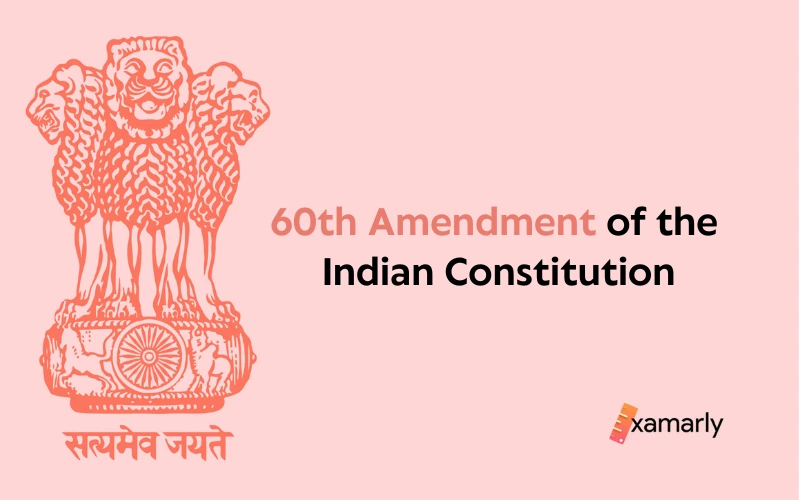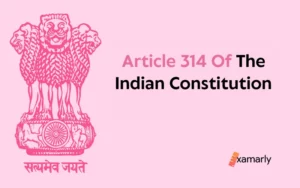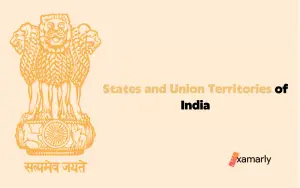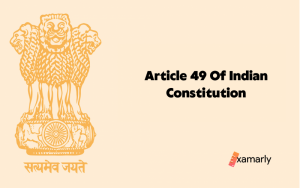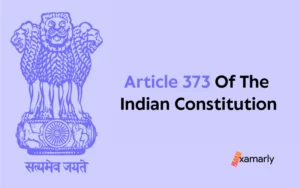In this blog on the 60th Amendment of the Indian Constitution, an outline of this constitutional amendment is provided. It discusses key details and information, Statements of Objects and Reasons, and notable participants. A detailed explanation of how the amendment came about is also included.
Prepare for your UPSC exam through this detailed blog and cover your UPSC syllabus in less time.
- 60th Amendment of the Indian Constitution: An Introduction
- Salient features and facts
- Date enacted
- Statement of Objects and Reasons
- Prominent people involved
- Important provisions
- Ratification
- Summing Up
- FAQs
- What is the 60th Amendment of the Indian Constitution?
- When was the bill for the 60th Amendment of the Indian Constitution introduced in the House of Parliament of India?
- Who introduced this bill?
- When was the 60th Amendment Act of the Indian Constitution passed?
- By how much was the ceiling of profession tax increased by the 60th Amendment of the Indian Constitution?
60th Amendment of the Indian Constitution: An Introduction
The 60th Amendment of the Indian constitution was amended for the revision of profession tax.
Article 276 of the Indian Constitution, which deals with taxes on professions, trades, callings, and employments, was altered by the Constitution (Sixtieth Amendment) Act, of 1988, which is known formally as the Sixtieth Amendment Act of 1988.
By Clause (2) of Article 276 of the Constitution, which was amended by Section 2 of the Act, the annual ceiling of profession tax, trades, callings, and employment was raised from 250 to 2500 rupees (equal to 2,400 in 2020).
The proviso to article 276 clause (2) was similarly left out by the 60th Amendment.
Also Read: 59th Amendment of the Indian Constitution
Salient features and facts
- The Bill aimed to change Article 276 of the Constitution, which deals with taxes on occupations, trades, and callings. The bill’s Section 2 altered Article 276 Clause (2) to raise the cap on taxation of professions, trades, callings, and employment from 250 rupees per person per year to 2500 rupees per person per year.
- The State Government represented that, the ceiling of two hundred and fifty rupees which was fixed in 1949 needs to make an upward revision because of price rise and other factors and elements.
- Additionally, the proviso to clause (2) of Article 276 was intended to be omitted.
- The total amount of taxes on professions, trades, callings, and employments that may be owed by any one person to the State, any one municipality, district board, local board, or other local body within the State shall not be more than 2,500 rupees per year.
Date enacted
The 60th Amendment of the Indian constitution was enacted on December 20, 1988, in the Thirty-Ninth Year of the Republic of India.
Statement of Objects and Reasons
Below is a list of the bill’s Statement of Objects and Reasons-
- 276.-In article of the Constitution’s clause (2) states that the total amount payable by a single person to the State or to any municipality, district board, local board, or other local authority in a State as taxes on professions, trades, callings, and employments leviable by a State Legislature under that article’s clause (1) shall not exceed 250 rupees per year.
- The proviso to that section, however, allows the continued imposition of such a tax at a rate greater than 250 rupees annually in any State, municipality, etc., if any such tax exceeding that rate was in effect in that State, municipality, etc. during the fiscal year that ended just before the Constitution took effect.
- Some State governments have argued that the ceiling of 250 rupees, which was established in 1949, needs to be increased in light of the increase in prices as well as other elements. It is also noted that the profession tax has currently turned almost discriminatory due to the ceiling since even those with high earnings are only required to pay a maximum of 250 Rupees per year.
- The State governments will be able to raise more money and additional resources due to the profession tax increase.
- Accordingly, it is recommended to change clause (2) of article 276 of the Constitution to raise the annual limit on profession tax from 250 rupees to 2,500 rupees. It is suggested to remove the proviso from this clause because it is no longer necessary.
- The objectives of the bill are those mentioned above.
Prominent people involved
On August 22, 1988, Bill No. 100 of 1988, the Constitution (Sixtieth Amendment) Bill, was introduced in the Lok Sabha by Ajit Kumar Panja. President Ramaswamy Venkataraman signed the law.
Related Reading: Tax Reforms
Important provisions
Amendment of Article 276.- Clause (2) of Article 276 of the Constitution reads as follows:
- The words “two thousand and five hundred rupees” shall be substituted for the terms “two hundred and fifty rupees”;
- The proviso is to be removed.
Ratification
On November 30, 1988, the Lok Sabha debated and then approved the Bill in its original form. The Rajya Sabha considered the Bill on December 5 and 6 and passed it on December 6, 1988, after it had been approved by the Lok Sabha.
On December 20, 1988, then-President Ramaswamy Venkataraman gave his approval to the legislation.
You Might Also Like: 61st Amendment of the Indian Constitution
Summing Up
Through this blog for your UPSC preparation, you learnt that the 60th Amendment of the Indian Constitution was made to alter profession tax by raising the annual cap from 250 rupees to 2500 rupees.
The Indian Constitution undergoes various types of amendments to protect the fundamental rights of its people and to ensure that the basic tenets of democracy are upheld.
FAQs
What is the 60th Amendment of the Indian Constitution?
By the 60th Amendment, the profession tax cap was raised from Rs. 250 per year to Rs. 2500 per year.
When was the bill for the 60th Amendment of the Indian Constitution introduced in the House of Parliament of India?
August 10, 1988
Who introduced this bill?
Ajit Kumar Panja, who was then serving as the Minister of State in the Department of Revenue. This department falls under the Ministry of Finance.
When was the 60th Amendment Act of the Indian Constitution passed?
December 20, 1988
By how much was the ceiling of profession tax increased by the 60th Amendment of the Indian Constitution?
By the 60th Amendment, the ceiling of profession tax was increased to two thousand five hundred.


